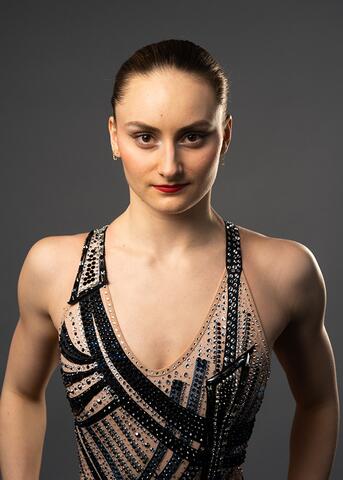
Ève Planeix
High-level synchronized swimmer and psychomotricity student
Participating in the Games at home, in front of the French public, is the Holy Grail of a career!
A psychomotortherapy student, Ève Planeix took the plunge into synchronized swimming at the ag e of nine. Since then, she has been training relentlessly to achieve her goal of standing on the podium at the next Olympic Games in Paris.
How did this passion for synchronized swimming come about?
In 2008, I watched the synchronized swimming at the Olympic Games in Beijing on television. As I was already a dancer, I immediately liked the artistic side of this sport: conveying an emotion, telling a story through the body, striving for perfection, surpassing oneself, the glitter and spectacle of it all as well, and then the all-so-important team spirit. And to top it all off, I realized you could win medals! I loved it. I started at the age of nine at the Synchro Riom club and two years later, I was spotted by the coach of the Pôle espoir in Sète, Rachel Lebozec-Chafes. When I was 12, I attended a boarding school 3.5 hours away from home. Although being so far from home wasn’t easy, I focused on my goal: joining the French team and competing in the Games! In 2016, I joined the Strasbourg club and signed up to the INSEP (The French National Institute of Sport, Expertise, and Performance).
What are you currently studying?
After my baccalaureate in economics and social sciences (ES), I completed a first year of STAPS (Studies in sciences and techniques of physical activities and sports) before joining the psychomotricity course at the Faculty of Medicine of Sorbonne University. The profession of psychomotor therapist, which I discovered quite late, was a real revelation. It requires qualities such as empathy, care, questioning, teamwork, knowledge of one's body and sensations, which I possess. I thrive in these studies. I know I will feel comfortable and at home in this profession after my career as a top-level athlete in synchronized swimming.
How do you reconcile your studies with high-level and how does Sorbonne University support you in this dual project?
It’s not easy and requires a lot of organization and adaptation. I train in the water from 8am until 1pm, then I train again for about three hours in the afternoon. In the evening, I catch up on all the lessons I missed during the day. Three free half-days are a chance to attend tutorials. My status as a high-level athlete (SHN) means I can take time off when I have selections, training courses or competitions. This year, I also benefit from the Passport for the Olympics scholarship programme supported by Crédit Agricole d'Ile-de-France Mécénat and the Sorbonne University Foundation. It provides me with financial support to pay for my studies and the INSEP, as well as trips to see my family.
What do the Paris Olympics mean to you and how are you preparing for them?
The Olympics have driven me since I started this sport. Participating in the Games at home, in front of the French public, is the Holy Grail of a career! Since our participation is guaranteed, our training sessions are focused on this competition. The pool is already bedecked with flags with the rings and the Paris 2024 logo. We’re already in the mood. But I don't think we can really imagine what lies ahead.
The first step is to be selected to the team. Then we focus on a place on the podium. This year, the rules are changing with a new scoring system on difficulty elements, lifts as well as execution and synchronization. Everything will be recorded to the nearest thousandth of a second. This more objective rating will give us a better idea of where to focus our progress, and the ranking of countries is likely to change significantly.
Do you have a lucky charm or a special ritual?
I have stuffed animals, which have followed me to the poolside since I was little, and a lot of rituals. Before the competition starts, I look around and imagine myself swimming in the pool. And then I need to touch the rhinestone heart that my mother has glued to all my swimming costumes and move around, jump around and feel the water on me.
What is your most vivid memory of a competition?
I brought three bronze medals from the European Championships home in Rome in 2022. It was incredibly emotional to see all the French flags waving, to stand on that podium that I had been focused on for so long. And just before that, in June 2022, my team and I came fourth at the World Championships in Budapest, and we achieved our best score. That was also a lovely memory.
Photographie © François Le Guen
Notable Achievements:
- 3 Senior World Championships (2017, 2019, 2022)
- 2 European Senior Championships (2018, 2022)
- 2 European Junior Championships (2016, 2017)
- 1 Mediterranean Confederation of Swimming (COMEN) Cup, French U23 team (2015)
